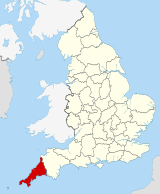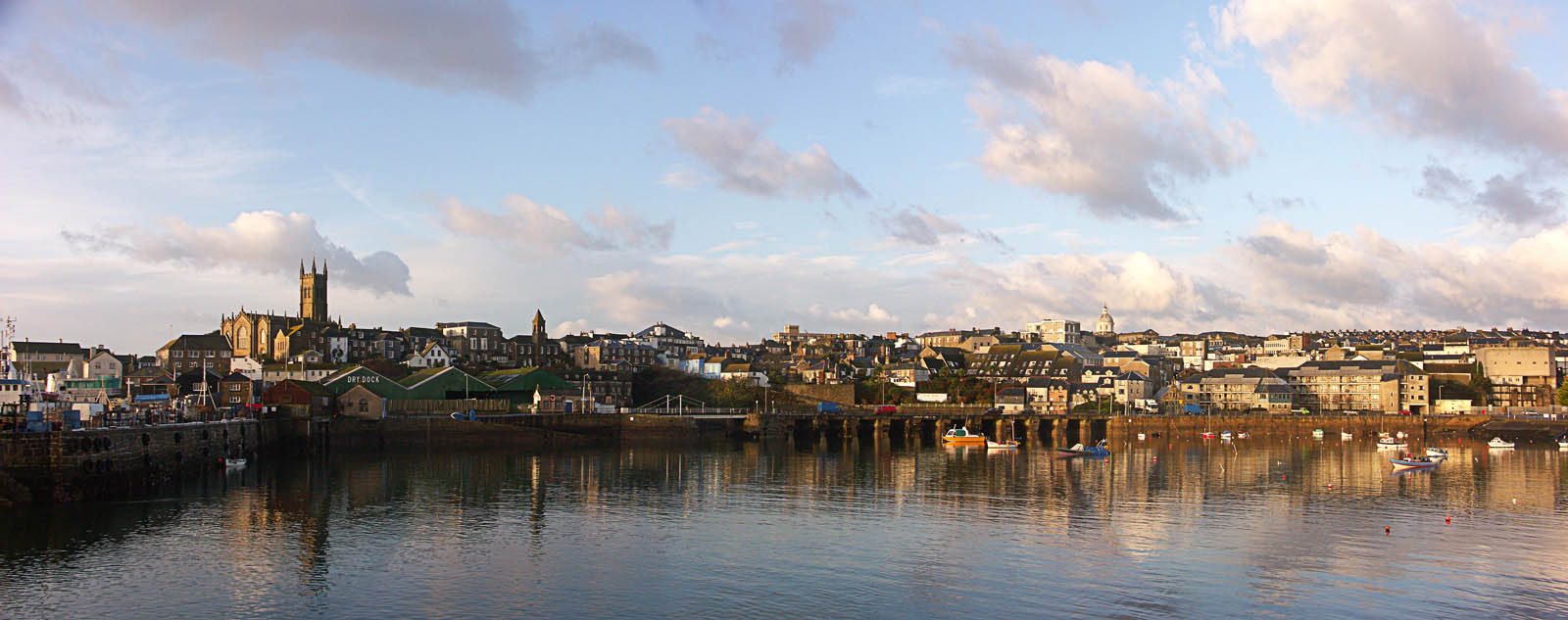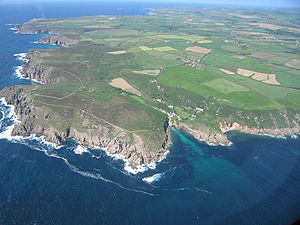  Cornwall (/ˈkɔːrnwɔːl, -wəl/; Cornish: Kernow; Cornish pronunciation: [ˈkɛrnɔʊ]; or [ˈkɛrnɔ]) is a ceremonial county in South West England. It is recognised by Cornish and Celtic political groups as one of the Celtic nations, and is the homeland of the Cornish people. The county is bordered by the Atlantic Ocean to the north and west, Devon to the east, and the English Channel to the south. The largest urban area in the county is a conurbation that includes the former mining towns of Redruth and Camborne, and the county town is the city of Truro. The county is rural, with an area of 1,375 square miles (3,562 km2) and population of 568,210. Outside of the Redruth-Camborne conurbation the largest settlements are Falmouth, Penzance, Newquay, St Austell, and Truro. For local government purposes most of Cornwall is a unitary authority area, with the Isles of Scilly having a unique local authority. The Cornish nationalist movement disputes the constitutional status of Cornwall and seeks greater autonomy within the United Kingdom. Cornwall is the westernmost part of the South West Peninsula, and the southernmost county within the United Kingdom. Its coastline is characterised by steep cliffs and, to the south, several rias, including those at the mouths of the rivers Fal and Fowey. It includes the southernmost point on Great Britain, Lizard Point, and forms a large part of the Cornwall National Landscape. The national landscape also includes Bodmin Moor, an upland outcrop of the Cornubian batholith granite formation. The county contains many short rivers; the longest is the Tamar, which forms the border with Devon. (Full article...) Selected article Cornish (Standard Written Form: Kernewek or Kernowek; [kəɾˈnuːək]) is a Southwestern Brittonic language of the Celtic language family. Along with Welsh and Breton, Cornish is descended from the Common Brittonic language spoken throughout much of Great Britain before the English language came to dominate. For centuries, until it was pushed westwards by English, it was the main language of Cornwall, maintaining close links with its sister language Breton, with which it was mutually intelligible, perhaps even as long as Cornish continued to be spoken as a vernacular. Cornish continued to function as a common community language in parts of Cornwall until the mid 18th century, and there is some evidence for traditional speakers of the language persisting into the 19th century. Cornish became extinct as a living community language in Cornwall by the end of the 18th century, although knowledge of Cornish, including speaking ability to a certain extent, persisted within some families and individuals. A revival started in the early 20th century, and in 2010 UNESCO reclassified the language as critically endangered, stating that its former classification of the language as extinct was no longer accurate. The language has a growing number of second-language speakers, and a very small number of families now raise children to speak revived Cornish as a first language. Cornish is currently recognised under the European Charter for Regional or Minority Languages, and the language is often described as an important part of Cornish identity, culture and heritage. Since the revival of the language, some Cornish textbooks and works of literature have been published, and an increasing number of people are studying the language. Recent developments include Cornish music, independent films, and children's books. A small number of people in Cornwall have been brought up to be bilingual native speakers, and the language is taught in schools and appears on street nameplates. The first Cornish-language day care opened in 2010. (Full article...) Selected biography Mark of Cornwall (Latin: Marcus, Cornish: Margh, Welsh: March or Marchell, Breton: Marc'h) was a sixth-century King of Kernow (Cornwall), possibly identical with King Conomor. He is best known for his appearance in Arthurian legend as the uncle of Tristan and the husband of Iseult who engages with Tristan in a secret liaison, giving Mark the epithet "Cuckold King". (Full article...)
Did you know?
Selected quoteSelected picture
General imagesThe following are images from various Cornwall-related articles on Wikipedia.
WikiProjects
Related portalsTopics |
|||||||||||||||||||||||||||










































